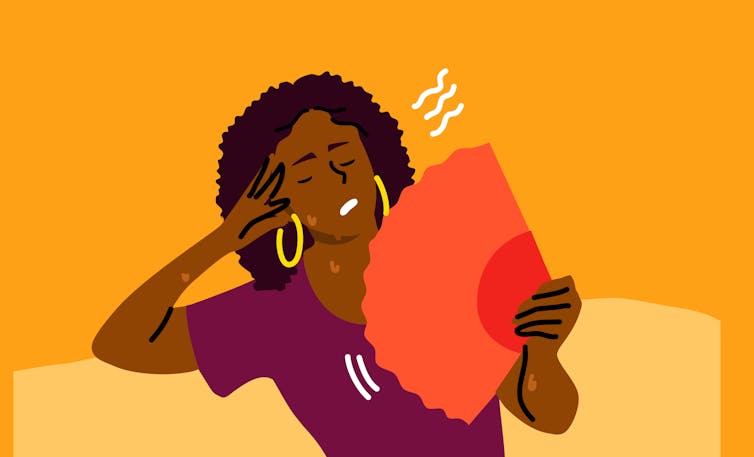Millions of women are working during menopause, but US law isn’t clear on employees’ rights or employers’ obligations
Tips

Naomi Cahn, University of Virginia; Bridget J. Crawford, Pace University , and Emily Gold Waldman, Pace University
While she was interviewing Jennifer Aniston and Adam Sandler in March 2023, Drew Barrymore suddenly exclaimed: “I’m so hot … I think I’m having my first hot flash!”
She took off her blazer and fanned herself dramatically.
While most hot flashes aren’t televised, the entertainer’s experience was far from unique. Barrymore, age 48, is one of approximately 15 million U.S. women from 45 to 60 who work full time and may experience menopausal symptoms.
Unlike Barrymore, most women are silent about their menopausal symptoms. Yet their symptoms, even when concealed from employers and co-workers, are a burden on them, their workplaces and on the overall U.S. economy. Lost work productivity due to menopausal symptoms – measured by missed work hours, job losses and early retirement – add up to about $1.8 billion annually, the Mayo Clinic estimates.
The three of us write and teach about employment discrimination and feminism, and two of us have written a book about menstruation. Because of our shared interests, we are currently writing a book about menopause and the law. We’ve observed that although Gwyneth Paltrow, Oprah Winfrey, Michelle Obama and other celebrities are speaking out about their own menopausal transitions, work accommodations are rare and employers typically don’t even acknowledge this stage of life.
Stigma and silence
In the lead-up to menopause, which typically begins between the ages of 45 and 55, levels of reproductive hormones change, and menstrual cycles become irregular and then eventually cease. This transition, called perimenopause, typically lasts for seven years.
Common symptoms of perimenopause include hot flashes, sleep disturbances, heart palpitations, excessive bleeding and irregular periods. Technically, menopause occurs after women don’t have a period for an entire year, and postmenopause is the stage after that. Transgender men and nonbinary people assigned female at birth can experience menopause too.
Employees who experience menopausal symptoms are often reluctant to talk about them at all, let alone tell their bosses. They may feel stigma and shame, and they may worry that it could hurt their chances for a promotion, their co-workers will see them as less capable or that their status at work will be otherwise jeopardized. These concerns are not unfounded.
In a series of studies, researchers asked workers and college students to describe their initial impressions of potential co-workers, including “a menopausal woman.” The participants described her as “less confident and less emotionally stable” than the non-menopausal women.
No legal protections
Employees who do speak up and seek accommodations for their menopausal symptoms, which might include dress code adjustments to deal with hot flashes, are often out of luck.
No federal law requires employers to accommodate menopausal symptoms.
Although the Americans with Disabilities Act requires employers to provide “reasonable accommodations” for workers with disabilities, U.S. courts have consistently held that menopause, by itself, is not a disability, even when its symptoms are seriously affecting someone’s ability to do their job.
That’s what happened to Georgia Sipple, a food product demonstrator who had a doctor’s note requesting permission to break a dress code by wearing short sleeves on the job. When Crossmark, her employer, refused, Sipple felt that she had no choice but to quit. She sued the company, but the Eastern District of California federal court dismissed her case.
Sometimes, employees even get punished for their menopausal symptoms or status.
When 911 operator Alisha Coleman experienced heavy perimenopausal bleeding that seeped through onto the office carpet, she was fired for failing to “maintain high standards of personal hygiene”. She sued, but the Middle District of Georgia dismissed her case, refusing to recognize her termination as a form of sex discrimination.
Instead, the judge drew a specious distinction, saying that Coleman had been fired for “being unable to control the heavy menstruation.” With the help of the American Civil Liberties Union, she appealed, later obtaining a confidential settlement.

Pregnancy and breastfeeding accommodations
Employees have far fewer legal protections for menopause today than for pregnancy and breastfeeding.
Congress first directly addressed pregnancy discrimination in the workplace in 1978 with the Pregnancy Discrimination Act. That law made it clear that pregnancy discrimination is a form of sex discrimination. This means that an employee who was fired because her water broke and she went into labor at work would, unlike Coleman, have a winning sex discrimination claim.
Congress also passed the Pregnant Workers Fairness Act in December 2022, which goes into effect on June 27, 2023. That law requires reasonable accommodations for pregnancy, childbirth and related medical conditions unless doing so would impose an undue hardship on employers.
Since 2010, Congress has required most employers to provide breastfeeding employees with reasonable break times to pump milk for one year after their children’s births, and also to provide them with a private place that isn’t a bathroom to do so. Most recently, in December 2022, the Providing Urgent Maternal Protections for Nursing Mothers Act expanded those protections.
Why not menopause?
In our view, pregnancy and breastfeeding offer a potential model for protecting workers from menopause-related discrimination and providing reasonable accommodations. Until Congress is ready to pass such legislation, there are other possibilities.
First, the Equal Employment Opportunity Commission, the agency responsible for enforcing anti-discrimination laws, could issue “best practices” guidelines.
These guidelines can be modeled on practices in the United Kingdom, where many business have adopted menopause policies. Climate-controlled break spaces, dress codes that incorporate short-sleeve options and breathable fabrics, dedicated menopause support and the like can all make a positive difference. The Equal Employment Opportunity Commission could also issue guidance highlighting menopause-based discrimination as a form of sex or age discrimination.
Additionally, even if the commission does not act, companies can adopt these kinds of policies on their own. That is already starting to happen, as U.S. businesses like the tech company Nvidia and the drugmaker Bristol Myers Squibb begin to establish some accommodations for menopause, including help with finding treatments.
New York Mayor Eric Adams has promised “more menopause-friendly workplaces,” at least for city workers.
To be sure, it can be risky to discuss symptoms at work, as this can undercut perceptions about women’s competence at work.
Given these symptoms’ prevalence, though, and the millions of workers experiencing them, we believe that breaking the silence can challenge and dispel these stereotypes – increasing the chances that they’ll remain on the job for many more years.![]()
Naomi Cahn, Professor of Law, University of Virginia; Bridget J. Crawford, Professor of Law, Pace University , and Emily Gold Waldman, Professor of Law; Associate Dean for Faculty Development, Pace University
This article is republished from The Conversation under a Creative Commons license. Read the original article.





Comments (5)
Best Company Reply
- Ali Tufan
- 2 days ago
Lorem ipsum dolor sit amet, consectetur adipiscing elit. Fusce vel augue eget quam fermentum sodales. Aliquam vel congue sapien, quis mollis quam.Because Other Candidates
- Martha Griffin
- 23 August 2018
Lorem ipsum dolor sit amet, consectetur adipiscing elit. Fusce vel augue eget quam fermentum sodales. Aliquam vel congue sapien, quis.Aldus PageMaker including versions Reply
Lorem ipsum dolor sit amet, consectetur adipiscing elit. Fusce vel augue eget quam fermentum sodales. Aliquam vel congue sapien, quis mollis quam.